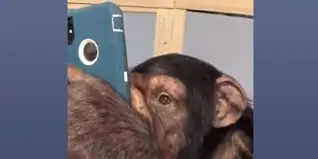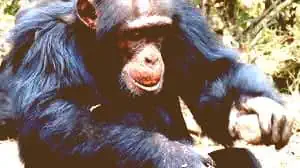Jane Goodall joined by 380 other prominent biologists, geneticists, anthropologists in calling for an end to Havard University’s allegedly abusive research on Macaques
by Martha Christina, South Africa
 Jane Goodall, famed primatologist, is once again taking a stand against animal cruelty.
Jane Goodall, famed primatologist, is once again taking a stand against animal cruelty.
Infant monkeys can suffer psychological and developmental problems when separated from the mom, very similar to human babies.
The findings on human children were made in the 1500s and 1600s. Experiments were also carried out on human children in the 1700s up until present day.
One such experiment occurred in Scotland, when human babies were removed from the mom, placed on an island with a mute woman and eventually suffered inability to speak (but used sign language), and psychological issues after being separated from their biological parents.
From Gizmodo, 2013,
A creepy 15th century language experiment took place on this island
Inchkeith Island, the Scottish Isle with the least romantic history possible. Not only was it a quarantine island for the earliest cases of syphilis, it was also home to two kids who were subjected to a very creepy language experiment.
James IV of Scotland enjoyed being a modern progressive king…
 James decided he wanted to find out what the “original” language of human beings was, he came up with an interesting experiment. He took two babies, and a woman who was deaf and mute, and marooned them all on Inchkeith Island. His idea was that the woman would raise the children in silence until they were old enough to start talking, at which point people would find out what language they spoke.
James decided he wanted to find out what the “original” language of human beings was, he came up with an interesting experiment. He took two babies, and a woman who was deaf and mute, and marooned them all on Inchkeith Island. His idea was that the woman would raise the children in silence until they were old enough to start talking, at which point people would find out what language they spoke.
Now creepy experiments are being conducted again, this time on Macaques by the United States National Institutes for Health.
From Common Dreams, Feb. 8,
Cruel Harvard Experiments
An NIH-funded Harvard Medical School lab run by neurobiologist Dr. Margaret S. Livingstone has used infant macaque monkeys to study visual recognition by depriving them of the ability to see faces, either by sewing their eyes shut or by requiring staff to wear welders’ masks around them. In some cases, the lab implants electrode arrays into the monkeys’ brains.
On February 8, a letter was sent out from the Harvard Law School’s Animal Law & Policy Clinic and the Wild Minds Lab at the St. Andrews School of Psychology and Neuroscience in the UK, harshly condemning alleged abuses of Macaque monkeys in research efforts at the university.
The letter is addressed to the taxpayer funded NIH in Washington DC. It reads in part:
This letter is being submitted to the National Institutes of Health (NIH) on behalf of the 381 undersigned scientists, doctors, academics, and lawyers who have serious concerns about NIH’s funding of unethical experiments on macaque monkeys and other non-human primates taking place at Harvard Medical School. As the attached more detailed request explains, we urge NIH to review the protocols and justifications for these experiments with an eye toward terminating the funding of these and other ongoing and future experiments on non-human primates that lack ecological validity and involve cruel and unnecessary treatment of laboratory animals.
The research involves removing baby Macaques from their mothers, at or near birth.
More:
By design, these experiments require maternal deprivation—a fact that drew the ire of scientists last fall, when Proceedings of the National Academy of Sciences (PNAS) published an Inaugural Article by Dr. Livingstone entitled Triggers for Mother Love. The article describes the lab’s practice of taking infant macaques from their mothers shortly after birth and attempting to appease the mothers’ distress by giving them plush toys as “surrogate infants.”
“I can say with complete confidence that we know that infant primates and their mothers suffer greatly when they are separated” — Dr. Wrangham, Harvard Univ.
 “As a primatologist with decades of experience in the field, I can say with complete confidence that we know that infant primates and their mothers suffer greatly when they are separated,” said Dr. Wrangham, Moore Research Professor of Biological Anthropology at Harvard University.
“As a primatologist with decades of experience in the field, I can say with complete confidence that we know that infant primates and their mothers suffer greatly when they are separated,” said Dr. Wrangham, Moore Research Professor of Biological Anthropology at Harvard University.
The letter is in reaction to researcher Margaret Livingtone at neuro.harvard.edu.
Additionally from Common Dreams:
“As a primatologist with decades of experience in the field, I can say with complete confidence that we know that infant primates and their mothers suffer greatly when they are separated. We also know that depriving infants of the ability to see faces will have adverse impacts on their brain and eye development,” Richard Wrangham, an anthropologist and primatologist at Harvard, said in a statement.
Of particular note, one of the signatories is a prominent paleo-anthropologist well-known to regular readers of this site, Dr. Agustin Fuentes, head of the Anthropology Dept. at Princeton University. Fuentes is a close friend and colleague of two individuals familiar to readers of this site, Dr. Lee Berger of the University of Witwatersrand in South Africa and Dr. John Hawks of the Univ. of Wisconsin-Madison. Berger of course is the discoverer of Homo naledi.
Dr. Fuentes has not issued a statement, but he Tweeted out the letter on February 9.
From his bio:
 Agustín Fuentes, a Professor of Anthropology at Princeton University, focuses on the biosocial, delving into the entanglement of biological systems with the social and cultural lives of humans, our ancestors, and a few of the other animals with whom humanity shares close relations. Earning his BA/BS in Anthropology and Zoology and his MA and PhD in Anthropology from UC Berkeley, he has conducted research across four continents, multiple species, and two-million years of human history. His current projects include exploring cooperation, creativity, and belief in human evolution, multispecies anthropologies, evolutionary theory and processes, and engaging race and racism.
Agustín Fuentes, a Professor of Anthropology at Princeton University, focuses on the biosocial, delving into the entanglement of biological systems with the social and cultural lives of humans, our ancestors, and a few of the other animals with whom humanity shares close relations. Earning his BA/BS in Anthropology and Zoology and his MA and PhD in Anthropology from UC Berkeley, he has conducted research across four continents, multiple species, and two-million years of human history. His current projects include exploring cooperation, creativity, and belief in human evolution, multispecies anthropologies, evolutionary theory and processes, and engaging race and racism.
“In 2016, we performed two reversible eyelid-closure procedures in macaques”
For her part, Dr. Livingstone has issued a statement. It reads in part:
 The joys and rewards of this labor are many. Our research has become the basis for a new clinical treatment for tremor. Our work has informed the design of experimental therapies for neurodegenerative diseases such as Alzheimer’s, as well as for the deadly brain cancer glioblastoma, the disease that killed my mother.
The joys and rewards of this labor are many. Our research has become the basis for a new clinical treatment for tremor. Our work has informed the design of experimental therapies for neurodegenerative diseases such as Alzheimer’s, as well as for the deadly brain cancer glioblastoma, the disease that killed my mother.
Despite the many joys of my work, it has at times, been misunderstood. Over the last several days, I have joined the ranks of scientists targeted and demonized by opponents of animal research…
Their tactics have miscast my work, twisted facts, and spread inaccurate and false information wrapped in emotionally charged, inflammatory language. This rhetoric has spurred aggressive and threatening messages, and I have become increasingly fearful for my safety and for the safety of my family.
However, later in the statement she does fully admit to experiments on at least two primates.
While non-human primates make up a tiny portion of animals used in biomedical research, they are invaluable in studies that require animals with a visual system, brain, immune system, and certain disease susceptibility similar to those of humans.
In 2016, we performed two reversible eyelid-closure procedures in macaques using dissolvable sutures, as described in the peer-reviewed literature.
Watch a very recent interview with Jane Goodall on YouTube by the Straights Times (Singapore), Feb. 1. Cover photo for this article.



In my opinion, the ethical limits of human experimentation should apply AT LEAST to all primates.
Monkey didn’t give his free will consent ? The answer is “no.”
Science has to find a different way. We’re smart enough, we can do that if we really try.
Duncan, I completely agree. Once spent an afternoon at the Cincinnati Zoo watching their Bonobo tribe, about a dozen or so Bonobos there. Astonishing how similar they are to us. They are sentient. Even lower primates.
Sadly, sentience doesn’t seem to matter to many people.
If we found octopi in another solar system we would devote massive resources trying to communicate with them. Instead of frying them up.